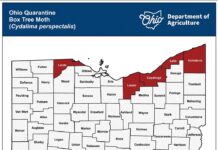CHARLESTON, W. Va. — The USDA’s 2007 Census of Agriculture showed that the average age of the American farmer had crossed 57 years for the first time. That’s up from 50.3 in 1978 — and farmers 65 and older are the fastest growing group of farm operators.
It seems all the kids these days are being lured into what they consider the “big-money” fields — technology, healthcare and the like.
However, Wesley Davis is proving that opportunities exist for young people to start up a farm enterprise, be their own boss and actually turn a tidy profit in the process.
Unusual
The Point Pleasant High School student and state FFA president is — notably — a first-generation farmer.
“There are several students in my FFA chapter that are active business owners. However, a lot of their families own farms. I’m kind of a rare case in that I don’t live on a farm and I’ve been able to build my own business. It’s something I’m really passionate about and put a lot of value in,” Davis said.
Turkey Creek Poultry Farms is located on Davis’ parents’ two-acre property, but the business is all Wesley’s. It started when Davis was in the seventh grade and he — without really asking his mother — brought home a chicken from the county fair.
“Since then, it’s blossomed into what it is today,” he said.
The operation currently consists of 250 free-range laying hens that produce about 20-dozen eggs a day.
He chose chickens that are especially efficient egg producers. Each can produce about a dozen eggs on four pounds of feed, and roughly 260-280 eggs per laying cycle.
Challenge
The biggest challenge initially, he said, was getting customers interested in the product.
“That took a lot of work in the beginning,” he noted.
But he now sells eggs to local households and to the nine schools in the Mason County school system.
Litter is stored in a shed and turned weekly to create compost. Davis received a grant from the USDA-Natural Resource Conservation Service’s Environmental Quality Incentives Program that paid the entire cost of his concrete-floored litter shed.
Funding
He received $5,000 in operating capital through a seven-year, low-interest loan from the USDA’s Farm Service Agency.
“Wesley is an outstanding individual, a great young farmer, and a superb leader of our state’s FFA organization. I am so proud when I see one of our state’s young people do so well,” said Commissioner of Agriculture Gus R. Douglass, who is the only other West Virginia FFA president from Mason County.
Revenue
Davis has been using proceeds to expand the flock and save money for college tuition. He says he’d like to study agriculture at West Virginia University and help other people start small farm businesses after he graduates.
Before he even graduates from high school, though, he’s been busy persuading his younger brother to take over Turkey Creek Farm when Wesley leaves Mason County for Morgantown
“Agricultural operations are so vital to our economy’s success, and small businesses like these fuel America’s economy,” said Davis. “One of the important things I like to tell everyone is that FFA and agricultural education are such a critical part of how my business has been able to be successful. It’s taught me public speaking skills, networking skills and all these extra business skills — and I’ve been able to take those and apply them here to my operation.”
He sees opportunity for agriculture in West Virginia and encourages young farmers to seek any of a number of niches such as small-production poultry, grass-fed beef or even beekeeping.
“One of the things that has been successful, surprisingly, is Christmas tree operations. Things like that that seem a little out of the ordinary are actually very successful in West Virginia,” he said.











Encouraging students to practice farming and other sustainable living practices is a great educational thing. Even families with just a back yard can be farmers, raise chickens for their own eggs, grown vegetable and other food. Teaching these ways of producing food especially organic chemical free food is an environmentally health way for the future of the generation and the planet.